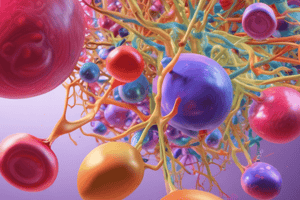Podcast
Questions and Answers
Clopidogrel is an example of which class of antiplatelets?
Clopidogrel is an example of which class of antiplatelets?
- Thrombin inhibitors
- P2Y12 ADP receptor blockers (correct)
- Direct Xa inhibitors
- Vitamin K antagonists
In which organ is clopidogrel activated for its drug effects?
In which organ is clopidogrel activated for its drug effects?
Liver
Which phrases describe the main functions of antiplatelet drugs? (Select all that apply)
Which phrases describe the main functions of antiplatelet drugs? (Select all that apply)
- Enhance platelet aggregation
- Increase thrombus formation
- Decrease platelet aggregation (correct)
- Inhibit thrombus formation (correct)
Prophylactic therapy with antiplatelet drugs is indicated in patients with a history of which conditions? (Select all that apply)
Prophylactic therapy with antiplatelet drugs is indicated in patients with a history of which conditions? (Select all that apply)
After administration, when would the nurse expect clopidogrel to start having its effect?
After administration, when would the nurse expect clopidogrel to start having its effect?
Which condition is Mr. Dibecki at risk for if he starts taking clopidogrel?
Which condition is Mr. Dibecki at risk for if he starts taking clopidogrel?
What action would the nurse take for a patient with acute coronary syndrome prescribed oral clopidogrel 300-mg one-time dose?
What action would the nurse take for a patient with acute coronary syndrome prescribed oral clopidogrel 300-mg one-time dose?
Which treatment for reversing the anticoagulant effects of clopidogrel would the nurse anticipate administering if a patient develops TTP?
Which treatment for reversing the anticoagulant effects of clopidogrel would the nurse anticipate administering if a patient develops TTP?
What action would the nurse take for a patient with an altered CYP2C19 gene before administering clopidogrel?
What action would the nurse take for a patient with an altered CYP2C19 gene before administering clopidogrel?
What action would the nurse take to reduce GI distress for a patient who has previously complained of dyspepsia after taking clopidogrel?
What action would the nurse take to reduce GI distress for a patient who has previously complained of dyspepsia after taking clopidogrel?
What action would the nurse take if a patient is prescribed clopidogrel and aspirin at 9:00 a.m.?
What action would the nurse take if a patient is prescribed clopidogrel and aspirin at 9:00 a.m.?
What action would the nurse take when resuming medications for a patient who returned from major knee surgery 1 hour ago?
What action would the nurse take when resuming medications for a patient who returned from major knee surgery 1 hour ago?
Flashcards are hidden until you start studying
Study Notes
Clopidogrel Overview
- Clopidogrel is a P2Y12 adenosine diphosphate (ADP) receptor blocker, a class of antiplatelet drugs.
- Activation occurs in the liver via the hepatic CYP2C19 enzyme.
Functions of Antiplatelet Drugs
- Antiplatelet drugs decrease platelet aggregation, preventing clots from forming.
- They inhibit thrombus (blood clot) formation, reducing the risk of thromboembolic events.
Indications for Antiplatelet Therapy
- Recommended for patients with a history of transient ischemic attacks (TIAs) to prevent future strokes.
- Indicated for individuals with a history of myocardial infarction (MI) to reduce the risk of subsequent MIs.
- Suitable for patients with Factor V Leiden deficiency due to increased clotting risk.
- Utilized in patients with a previous ischemic stroke to prevent future thromboembolic events.
Onset and Monitoring
- Clopidogrel begins to take effect within 1 to 2 hours post-administration.
- Use of clopidogrel increases the risk of bleeding, particularly when combined with other antiplatelet drugs like aspirin.
Administration Guidelines
- A loading dose of oral clopidogrel (300 mg) is appropriate for acute coronary syndrome patients.
- If thrombotic thrombocytopenic purpura (TTP) develops, fresh-frozen plasma is the anticipated treatment to reverse anticoagulation effects.
Genetic Considerations
- Patients with altered CYP2C19 genes are poor metabolizers of clopidogrel, heightening the risk of complications; healthcare providers should be notified in such cases.
Managing Side Effects
- Administration of clopidogrel with a small amount of food is advisable to minimize gastrointestinal distress, a common side effect.
- Both clopidogrel and aspirin show enhanced antiplatelet effect when given together.
Post-Surgery Considerations
- Clopidogrel can be administered following major surgery, with close monitoring for potential bleeding at the surgical site.
Studying That Suits You
Use AI to generate personalized quizzes and flashcards to suit your learning preferences.




